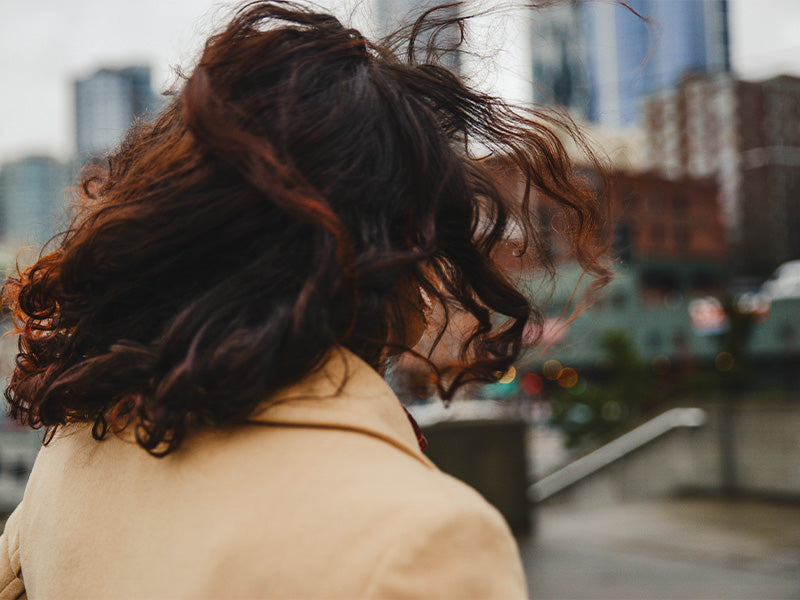
WHY DOES WINTER WREAK HAVOC ON OUR LOCKS?
Those of us with wavy hair are slightly more resilient to the seasonal change in weather but we still face some battles due to changes in air moisture. Reduced moisture in cold air makes wavy hair fall flat, while indoor heating and hot showers frizz it right back up - the worst of both worlds! (Stanborough, 2019)
Medical researchers from the Nigerian Journal of Dermatology (2021) explain that women with curly, kinky and coily hair types have a curved follicle structure which makes it harder for the natural oils and moisture from the scalp to move along and down each hair strand. With the harsh changes from indoor to outdoor temperatures, in winter the hair’s protective layer also becomes weaker which means moisture escapes more easily and increases breakage.
Considering there’s no avoiding the cold (unless you have the luxury of being a summer-to-summer hopper… we’re jealous), here are a few light adaptations you can make to your routine.
LOW-HANGING FRUIT
Beyond (of course!) wearing a silk hair wrap to lock in the moisture overnight, remember that your hair and skin health are intimately intertwined.
First, don’t leave the house and brave the cold with wet hair. When hair is wet, the bonds are weaker making it easier for our hair to break. We all know this, but for us busy women - it’s sometimes tempting to let that slip!
Because your hair is weaker when wet, it’s best to avoid tying up your hair after the shower, even inside the house, and whatever your hair type. To get your hair out of your face, maybe use a bandanna or hair wrap.
When it comes to using a hairdryer, the curlier your hair is, the less beneficial this is, and for kinky and coily hair, it’s usually not recommended. This is a dilemma in winter: for curly hair, consider alternating between diffusing your hair and natural drying. For coily hair, schedule your wash day carefully, or wrap your hair while it dries. For kinky, coily and curly hair, deep conditioning or oil treatments can help infuse some extra moisture. Consider doing this at least once a months, depending on your specific hair. (Nigerian Journal of Dermatology, 2021)
However, if your hair is straight you don’t have to worry about all of that! It’s usually preferable to use a hairdryer than letting your hair dry naturally in winter. In general use a microfibre towel or a cotton towel with a fine flat weave. Remember a hairdryer is a heat tool, which increases our hair’s tendency to frizz, so a heat protector spray is important (think sunscreen for your skin). If your hairdryer has multiple settings, it's also a good idea to avoid the hottest one. (Vogue, 2019)
Some final simple tips (and sorry to sound like your mum): stay hydrated, moisturise your skin, take your vitamins and avoid over-shampooing. Shampoo in particular can break down and strip our hair’s natural oils, and these oils give our hair its moisture and shine. Reducing the use of shampoo is good for our hair, reduces our get-ready time and is great for the environment!
Hope this helps and if you have a question or any tips you’d like to share, please comment below.
REFERENCES
Nigerian Journal of Dermatology, 2021
Healthy Hair Care Practices; Caring For The African Type Hair
https://www.nigjdermatology.com/index.php/NJD/article/view/180
Vogue, 2019
Why winter is wreaking havoc on your hair—and how to solve it
https://www.vogue.com.au/hair-insider/why-winter-is-wreaking-havoc-on-your-hairand-how-to-solve-it/news-story/8e7e8b88c4bc92e4e66de3a651d67464
Stanborough, Rebecca. 2019.
https://www.healthline.com/health/beauty-skin-care/types-of-hair




very helpful blog
Thanks for the tips.
Great and informative blog! Thanks for the tips 🥰
I have curly hair if not dried naturally or correctly with a diffuser will frizz, also if damp atmosphere frizzes, all my life had problem hair any advice helps as older now & noticed how my hair has changed
Leave a comment